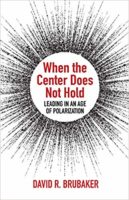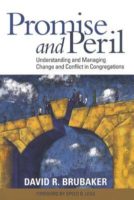Pastor Bethany feels like a punching bag. For the past decade her denomination has held wrenching debates at its national conference about how to respond to individuals in same sex relationships who desire to be ordained to ministry, and members of her congregation are increasingly losing patience with the “dialogue.” Polarization has set in and Pastor Bethany feels trapped in the middle.
Last Sunday, Joe, a member of Pastor Bethany’s congregation verbally assaulted her after the worship service. “I’m sick and tired of being associated with this liberal denomination!” Joe said in the line out of the sanctuary. “I won’t give another dollar to this congregation until you can prove that not a penny goes to the denomination.” Pastor Bethany thanked Joe for his passionate concern and turned to the next person in line, her hand visibly shaking.
This morning Pastor Bethany opened her email and found an email from Bryson, a younger member of the congregation who is a vital part of the worship team. “Although I personally do not identify as LGBTQ,” he wrote, “I can no longer associate myself with a congregation that is unwilling to take a clear stance for justice for all members of our congregation. I am hereby resigning, and will not return until and unless this congregation takes a public stand for full inclusion.”
Pastor Bethany does not know where to turn. She believes that about a third of her members strongly desire the congregation to become “welcoming and affirming,” while another third wants the congregation to affiliate with a “traditional marriage” group in the denomination. While Pastor Bethany believes that Jesus would exclude no one from the table, she values all the members of her congregation and doesn’t want to alienate either group. What can she do?
Pastor Bethany’s dilemma will be familiar to many pastors of congregations affiliated with Presbyterian, Lutheran, Methodist, Episcopal, Mennonite and other traditions. The polarities are framed in stark and compelling terms (“Human Rights!” “Biblical Faithfulness!”), and pastors feel torn by the riptides in their traditions. As one pastor recently confessed to me, “I never imagined that the denomination I love and have given my life to would become a source of pain and division.”
Many pastors are aware that the current conflict raging over human sexuality is a proxy for deeper issues of Biblical interpretation, demographic differences, and power struggles. People often find it simpler to argue about issues that present simplistic binary choices. “Are you for the pastor or against him?” “Do you support the building project or oppose it?” “Will it be traditional worship or contemporary?” These “identified” issues, reduced to their most simplistic and binary categories, are easy to comprehend and strangely comforting to take sides on.
Pastor Bethany resists these dualistic categories because she values members at all points of the spectrum. Joe, the parishioner who threatened to terminate his giving unless the congregation cut its ties with the denomination, has quietly contributed thousands of dollars and hundreds of hours to the congregation’s “Hot Lunch for the Homeless” program. And Bryson, the young man who threatened to withdraw from worship ministry, visits elderly shut-ins every Sunday afternoon. Bethany knows both of them to be committed, compassionate, self-sacrificial men.
The all-or-nothing thinking demonstrated by both Joe and Bryson, however, is characteristic of Level 4 conflict. More than 30 years ago, Speed Leas of the Alban Institute described observable behaviors in Level 4 conflict (on a 1 to 5 conflict scale) in the following terms:
“Shifts from winning to getting rid of person(s). No longer believe others can change, or want them to change. Cold self-righteousness. Will not speak to the other side. Factions are solidified. Clear lines of demarcation….Limited only to the cause being advocated; will not accept/listen to contrary information. Talk now of ‘principles’ not ‘issues.’ Language solidifies into ideology. No longer winning; now eliminate others from the environment. Hurt the other person/group. High probability of split within the organization with a possible loss of persons from the organization.”
By the time conflict has reached a high Level 4 on the Leas’ conflict scale, “win-win outcomes” are no longer possible. But two strategies can prove effective. First, Pastor Bethany can move to strengthen the center in her congregation—primarily by reaffirming the core identity and purpose of the congregation (see my article “The Importance of Shared Identity and Purpose”). Second, Pastor Bethany can work with her leadership team to change the ending of their conflict story by committing to engage conflict rather than avoid it. When congregational leaders highlight shared identity and purpose and promote engagement across differences they create a conflict-healthy system that is more likely to resist the virus of destructive conflict.
While Pastor Bethany’s congregation and denomination have become the locus of the conflict tearing at the fabric of them both, neither is its cause. The root causes lie in a dominant American culture that is increasingly polarized along social, political, and class lines—differences that have surfaced in the current identified issue of human sexuality. Yet Pastor Bethany and her leadership team are not powerless in the face of this polarized context. While confronting the perils of all-or-nothing thinking, they can assert the broader identity and overarching purpose that bind the congregation together, and can choose to engage individuals across differences rather than avoid them. It will likely be impossible to avoid any losses from this painful conflict, but minimizing those losses while moving forward as one congregation remains a realistic goal.
David Brubaker has consulted with organizations and congregations in the U.S. and a dozen other countries on organizational development and conflict transformation. He is the author of Promise and Peril, on managing change and conflict in congregations, and When the Center Does Not Hold, on leading in an age of polarization. David serves as Dean of the School of Social Sciences and Professions at Eastern Mennonite University and is a professor of organizational studies.



